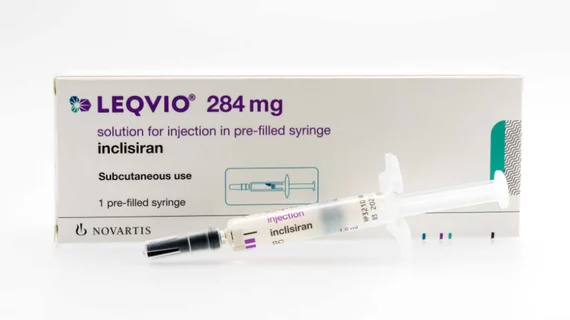4 new medications and technologies that could transform cardiology in 2022
Cleveland Clinic shared its annual list of 10 medical innovations expected to make a big impact on patient care in 2022. While the analysis covers multiple areas, including mRNA technology and medical imaging, four items on the list apply directly to cardiology.
There were three cardiovascular medications and a new artificial intelligence technology to aid in the fight against hypertension included in Cleveland Clinic’s report:
1. Inclisiran lowers LDL with just two doses per year
Inclisiran is the new medication designed to lower low-density lipoprotein cholesterol (LDL-C) with just two doses per year. Manufactured by Novartis, and sold under the name Leqvio, Inclisiran is given to patients as an initial injection and then a follow-up injection three months later.
Inclisiran was approved by the FDA back in December 2021.
2. Tirzepatide significantly reduces hemoglobin A1C in type 2 diabetes
Tirzepatide, a once-weekly injectable dual glucose-dependent insulinotropic polypeptide (GIP) and glucagon-like peptide receptor agonist (GLP-1) manufactured by Eli Lilly, has shown early potential to control blood sugar and slowing digestion.
“Thus far, late phase III clinical trials reveal that the treatment significantly reduces hemoglobin A1C in type 2 diabetes and supports weight loss, making it potentially the most effective therapy for diabetes and obesity yet developed,” according to the report.
The medication is still being studied.
3. Mavacamten may offer a targeted medication for hypertrophic cardiomyopathy
Mavacamten is Bristol Myers Squibb’s new drug for treating patients with symptomatic hypertrophic cardiomyopathy (oHCM). According to the report, the medication could provide “new hope” to both patients and physicians if it hits the U.S. market. If approved, this would be the first medication explicitly dedicated to treating HCM.
The FDA is expected to announce its final decision on approving the drug by the end of April.
“We are confident in the profile of mavacamten,” Samit Hirawat, MD, executive vice president and chief medical officer of global drug development for Bristol Myers Squibb, said in a 2021 statement. “This first-in-class cardiac myosin inhibitor demonstrated clinically meaningful improvements in symptoms, functional status, and quality of life in symptomatic oHCM patients in the pivotal EXPLORER-HCM trial. We look forward to continuing to work closely with the FDA to bring this important medicine to patients.”
MyoKardia, the drug’s original manufacturer, was acquired by Bristol Myers Squibb in October 2020 for $13.1 billion.
4. Predictive analytics can identify at-risk hypertension patients
High blood pressure usually shows no symptoms, but greatly increases risk for serious health problems, including heart disease, heart failure and stroke. Effective treatment options exist, but many adults remain unaware they have hypertension until they experience a significant health crisis. Using machine learning, physicians are able to better select more effective medications, medication combinations, and dosages to improve control of hypertension. Cleveland Clinic said artificial intelligence (AI) also allows physicians to predict cardiovascular morbidities and enable physicians to focus on better on prevention effortss. Predictive analytics equip providers with the key that could open the door to preventing hypertension and many other diseases.
Read the full Cleveland Clinic report here.
Related Content:
Too much Tylenol? Daily acetaminophen use may be bad for hypertension patients
Hospitals seeing more patients with uncontrolled blood pressure
FDA approves inclisiran, a twice-yearly injection that lowers cholesterol
FDA delays decision on Bristol Myers Squibb’s new heart disease drug

